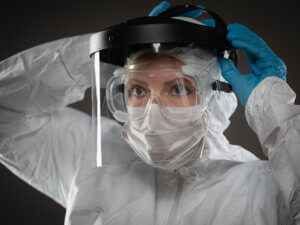Last Updated on May 28, 2020, 5:02 pm ET
This guest post was written by Elise Monsour Puckett, communications and development coordinator for Virginia Tech University Libraries.

Virginia Tech University Libraries is participating in a university-wide project to create personal protective equipment (PPE) for healthcare workers in Southwest Virginia during the COVID-19 pandemic.
Max Ofsa, 3D Design Studio manager, has been leading the University Libraries’ involvement with the initiative’s task force. Ofsa has specifically been working with 3D printing teams to produce PPE using the library’s 3D printers.
In March, the university task force divided into teams to carry out 10 projects in rapid science and production, working together to provide Southwest Virginia medical professionals with a first line of defense. The group is designing and creating ventilator components and personal protective equipment. The University Libraries is assisting with five of the ten projects and is proud to be helping print the masks.
The collaborative group unites Virginia Tech faculty in subjects like product design, fabrication, materials science, biosciences, virology, and sterilization. These experts are from colleges and institutes of the College of Engineering, the College of Science, the Virginia Tech Carilion (VTC) School of Medicine, the Fralin Biomedical Research Institute at VTC, the School of Architecture + Design, and the Edward Via College of Osteopathic Medicine.
Mechanical engineering professor Alex Leonessa, director of the Terrestrial Robotic Engineering and Controls Laboratory, and Liam Chapin of the Field and Space Experimental Robotics (FASER) Laboratory, are leading a team headed by mechanical engineering professor Erik Komendera to organize the mass production of the face shields. The team has been rapidly prototyping designs and ran 15 styles by Carilion Clinic and LewisGale Hospital staff before finalizing the face shield.
The group has worked out modifications for some of the PPE items, and Ofsa has been offering his expertise on problem-solving for the design portion of the project, specifically face shield design, alongside engineering faculty and students. Ofsa has also been 3D scanning components of machines for retrofitting/reverse engineering and working with Linsey Marr, professor of civil and environmental engineering, on scanning testing apparatuses from the Aerosol Lab so they can have more capacity to test mask efficacy.
“The University Libraries responded very quickly when we asked to scan a manikin that we wanted to use for testing masks. We only had two manikins and wanted the option to be able to make more of them, and make them a little larger, to expand our testing capacity,” explained Marr. “We gave the University Libraries a manikin head to scan, and they returned it the next day along with files of the object. The head was pretty small, almost child-size, so now we can make a bigger adult-size one for testing.”
After Virginia’s stay-at-home directive and Virginia Tech’s move to essential operations closed Newman Library, Ofsa and Jonathan Bradley, head of studios and innovative technologies, sprang into action. “We quickly pulled the 3D and resin printers from the building so we would have the at-home capacity and resources to 3D print and safely contribute parts for printing face shields,” explained Bradley.
“We are working around the clock with about 16 printers,” said Ofsa. “We are both printing from home, as are some of our library student workers, Sarah Loomis and Matt Winn, to produce the frames for the face shields.” The University Libraries is collaborating with Kaelum Hasler from Rendyr, an emerging desktop robotics company, who is producing the clear, laser-cut pieces for the front of the shield. Ofsa is also testing more advanced pieces on the resin machines.
The university-wide task force along with research groups have teamed up to design, produce, and test the critical PPE and ventilator components. Prototypes are being created, the face shield design is starting to be finalized and pass infection-control review, and the team is ramping up for production.



